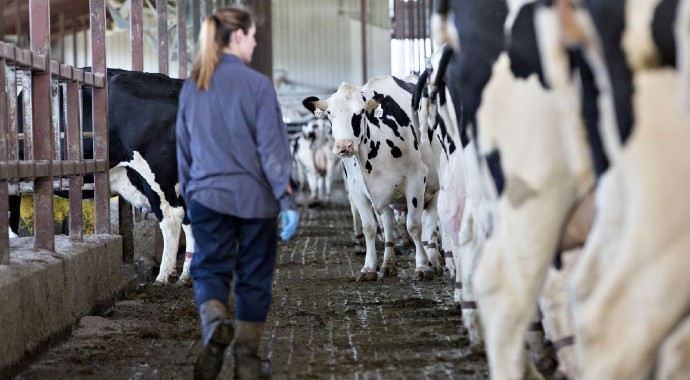
— The FDA is loosening packaging and labeling rules for eggs sold in retail, which weren’t covered by the agency’s action last month to relax certain nutritional info requirements. Besides the annual pre-Easter surge in sales, eggs were flying off shelves as people stuck at home started baking more, out of necessity or for leisure.
— A merger between two dairy industry giants was approved on Friday. But the bankruptcy judge overseeing the sale left the door open to legal challenges from certain grocers and dairy cooperatives on antitrust grounds.
FOOD SYSTEM FACES ‘TSUNAMI’ OF CHANGING DEMAND: Foodservice distributors and shuttered restaurants are rapidly rerouting their food to retailers, where a surge of shoppers have left store shelves barren. As businesses and regulators scramble to adapt, it’s blurring the lines between what were previously two separate supply chains, Pro Trade’s Adam Behsudi and your host report.
Bahige El-Rayes, a partner at consulting firm Kearney, said his clients are seeing a “tsunami of demand shift from foodservice to food retail.”
— By the numbers: In 2018, Americans spent about $678 billion at full-service and fast-food restaurants, compared with $627 billion at grocery stores and warehouse clubs, according to USDA data.
— Now, the National Restaurant Association expects the industry will shed $225 billion over the next few months, along with some 5 million to 7 million jobs.
“We have this massive reorganization of how people buy their food,” said Pat Westhoff, director of the University of Missouri’s Food and Agricultural Policy Research Institute. “Since we’re buying more at the grocery store, it means [food items] have to be in that form.”
In response: The FDA in March gave restaurants and manufacturers a greenlight to sell packaged foods to retailers without the usual nutrition labeling requirements. Meanwhile, top grocers and foodservice distributors, like Kroger and Sysco, are teaming up to keep store shelves stocked and provide new job opportunities for furloughed workers.
AGRICULTURAL DUMPING ACCELERATES: Meanwhile, farmers cut off from their usual markets have started tossing their fresh fruits, vegetables and milk. Dairy producers are asking the government to buy up more commodities and distribute them to food banks and school feeding programs.
Wisconsin cheesemakers are struggling to make up for lost demand from the foodservice sector, which accounts for half of all cheese sold in the U.S., according to industry data. Grocery stores account for just one-third of sales.
— “We’ve lost 25 percent of our income just through the crashed market,” said Gordon Speirs, owner of Shiloh Dairy in Brillion, Wis. “Now we face the reality of having to dump milk on top of that.”
Florida vegetable growers are also seeing bids dry up, from shuttered restaurants and schools to big buyers like Disney World and cruise lines. They’re starting to dump crops, too, from grape tomatoes to zucchini and yellow squash, which are fetching market prices far below the cost of picking and packing, says Palm Beach County farmer Jim Alderman.
— “They’re cutting their squash every day and throwing it on the ground, hoping the market will turn around,” Alderman said.
FDA ROLLS BACK EGG REGS: The agency is offering a temporary reprieve from packaging rules for shell eggs so the industry can keep up with booming demand from shoppers. “Additional shell eggs for consumers are available, but appropriately labeled retail packaging is not available for all such shell eggs,” the FDA wrote in guidance released over the weekend.
Here’s the deal: The agency “does not intend to object” to retailers selling eggs in cartons or flats without labels, as long as stores clearly display certain information like the manufacturer/distributor and safe handling instructions re: salmonella.
The baking boom: Stress-baking and hoarding has fueled egg shortages in stores in recent weeks. There’s even a spike in demand for live chickens with people looking to produce their own eggs. Cluckingham Palace, which raises and sells chicks near San Antonio, has waiting lists as long as two weeks, with some customers seeking 150 birds at a time, the Express-News reports.
DAIRY MARRIAGE OPEN TO OBJECTIONS: A federal bankruptcy court approved Dairy Farmers of America’s bid to purchase most of Dean Foods’ assets for $433 million. But the largest U.S. dairy cooperative and top milk processor, respectively, agreed to include language in their sale contract that would let certain grocery chains or dairy groups file claims against the mega-merger, writes POLITICO’s Leah Nylen.
How we got here: Dean filed for Chapter 11 bankruptcy in November, after recording net financial losses for seven of the previous eight quarters. The industry has been hammered by trade headwinds, a labor shortage and low prices, as fluid milk consumption has fallen by more than a quarter over the last two decades.
DFA and Dean are now in discussions with the Justice Department, which is reviewing the deal on antitrust grounds. If the DOJ raises any flags, it could file a complaint in federal court. The case would then either proceed to trial, or Dean and DFA could agree to settle and sell facilities where the companies’ operations overlap. But a settlement would also require court approval, which can take several months.
The Maryland & Virginia Milk Producers Cooperative Association, California Dairies and grocery chains Stop & Shop and Food Lion are all eligible to file antitrust claims against the merger.
— Canada and Mexico have completed all of their internal requirements for the USMCA to take effect, and the deal could enter in force on July 1 if the U.S. sends its notification this month. But it’s unclear if the three nations have yet developed uniform standards for auto rules, our Pro Trade friends tell MA. And Canadian Deputy Prime Minister Chrystia Freeland has said only that she hopes to see the deal take effect by later this year.
— Congressional leaders are starting to find some consensus on the next economic stimulus package. House Democrats are scaling back their ambitions for the “Phase 4” legislation, while Republicans are growing more open to the idea of another economic relief bill, report POLITICO’s Heather Caygle and Burgess Everett
— Biofuel producers are asking the Agriculture Department to use its new stimulus spending power to bolster the struggling ethanol industry, which has seen demand fall sharply as drivers stay home and gasoline consumption plummets. Ethanol production also accounts for about 40 percent of corn demand. Reuters has the story.
— An outbreak of African swine fever in the U.S. could cost pork producers $50 billion over a decade, between lost exports and a 50 percent drop in prices as the domestic supply swells, according to research from farm economists at Iowa State University. National Hog Farmer has the details.
— USDA’s Commodity Credit Corporation lowered its borrowing rate-based charge for April to 0.625 percent, down from 1.5 percent in March. The CCC also slashed rates for farm and sugar storage facility loans, the agency announced.
— Potato farmers in the Netherlands saw their market collapse overnight with the closure of Dutch restaurants in mid-March, leaving a million tons of spuds to pile up in storage. The country’s food potato production is about 4 million tons annually, a quarter of which is exported, Reuters reports.

























